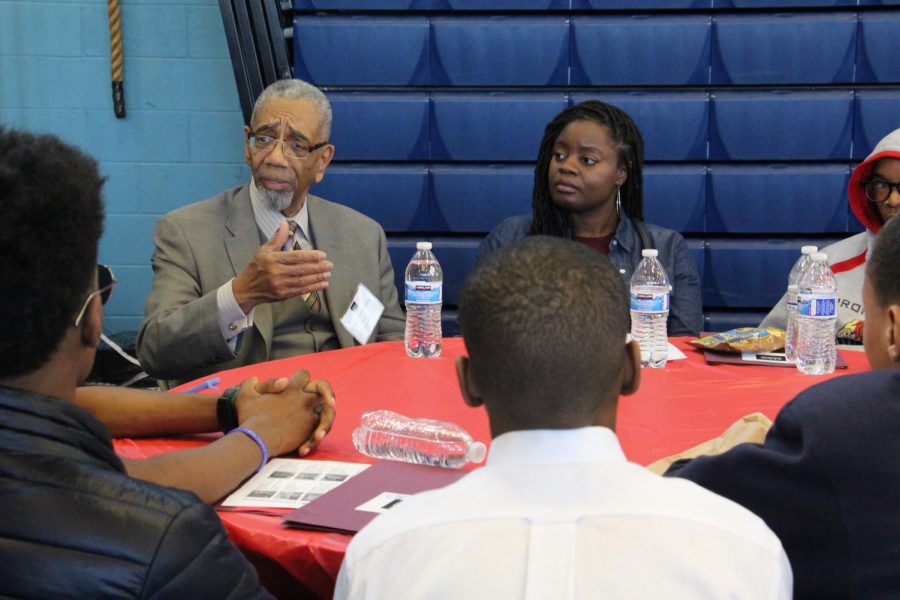City leaders propose ideas to support ‘black futures’
February 15, 2016
More than 400 high school students from across Chicago packed into the Jones College Prep High School auditorium Feb. 6 for the Youth Voice Congress, where students met with their peers and elected officials to discuss strategies for improving their respective communities.
Joshua Prudowsky, education campaign director for Mikva Challenge, which organized the Congress, said he thinks young people should be involved when job creation is discussed.
“It’s unheard of to see young people sit down and talk to elected officials,” Prudowsky said. “[Youth] should be given the tools and space to implement their own ideas, too.”
More than 65 schools were represented at the event and more than 40 elected officials were present, according to Prudowsky. He said students can apply for a $1,000 grant from Mikva Challenge to fund a test run of their job creation projects at their schools.
The Mayoral Youth Commission, a youth policymaking council affiliated with Mikva Challenge, is applying for the grant to fund a coding education project that aims to bridge the “digital divide” and connect young people with digital-industry careers.
With Illinois in its eighth month without a state budget, Chicago Public Schools in a financial crisis and community relations with the Chicago Police Department at a low ebb, Chicago youth leaders and advocates are pushing forth their own solutions to problems.
A report released in January by the University of Illinois at Chicago’s Great Cities Institute states that 47 percent of 20- to 24-year-old black men in Chicago, and 44 percent in Illinois, were out of school and out of work in 2014, as reported Feb. 1 by The Chronicle.
Jack Wuest, executive director of the Alternative Schools Network, which commissioned the report, said he believes there should be a national commitment to funding pathways to employment opportunities for youth.
Wuest said investing in youth employment training and skill development makes good sense from an economic standpoint.
“[Being employed] means reduction of violence in communities, a strengthened workforce, and efficiently-spent taxpayer money,” Wuest said. “We keep throwing money down the drain when these kids need opportunity.”
Darlene Gramigna, director of a youth peace-building and justice program at American Friends Service Committee, said she thinks job training and placement programs need to be built into schools and should focus on developing a wide range of skills.
At AFSC, Gramigna collaborated with a group of youth who developed a social enterprise producing fair trade art. Young people learned the business of art and earned half their funding through sales. Gramigna said solving the jobs crisis requires more than just connecting people with employment.
“We should train people for life instead of dumping [them] into the workforce whether they have the skills or not,” Gramigna said.
Gramigna said economic policy-making needs to include people who often get left out of the process, such as undocumented youth.
While undocumented people are restricted from most employment because of their legal status, they need to sustain themselves, which often means finding work in precarious settings, Gramigna said.
“These are [young] people that could be employed,” Gramigna said. “Instead, they’re put in a position of chronic joblessness.”
Trina Reynolds-Tyler, a member of Black Youth Project 100, said talk of economic opportunity too often excludes poor black people.
In late January, Black Youth Project 100 released the “Agenda to Build Black Futures,” an economic justice campaign that calls for investment in black communities along with reparations for “historical injustices.”
Some of the recommendations include: adoption of a worker’s bill of rights, reallocating prison budgets to job training programs, and establishment of local participatory budgeting processes.
Reynolds-Tyler said a variety of young black people who are in school, unemployed or who come from other diverse socio-economic statuses developed the platform.
“We are thinking further than just walking in the street,” Reynolds-Tyler said. “A lot of us don’t have college degrees. It deconstructs this idea that you need all these accolades to contribute.”








